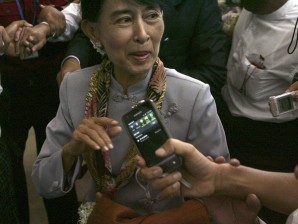Suu Kyi sets out on first Europe trip in 24 years

Myanmar opposition Leader Aung San Suu Kyi talks to reporters as she arrives at Yangon International airport Wednesday, June 13, 2012, in Yangon, Myanmar. Suu Kyi takes her first European trip since 1988 Wednesday to make a long-awaited acceptance speech for the 1991 Nobel Peace Prize and at a time when Myanmar is making tenuous democratic progress. AP/Khin Maung Win
YANGON, Myanmar — When Aung San Suu Kyi last saw Europe, it was still divided into the democratic West and communist East. Her homeland of Myanmar was still under oppressive military rule.
The long-time democracy activist set out Wednesday on her first European trip since 1988 to make a long-awaited acceptance speech for the 1991 Nobel Peace Prize and at a time when Myanmar is making tenuous democratic progress.
Her scheduled return to Myanmar by the end of the month gets her back in time to attend the July 4 reconvening of Parliament, which was announced Tuesday night on state television. The parliamentary session will be considering crucial legislation, including media regulation and foreign investment.
Cheerful and energetic at Yangon’s airport, Suu Kyi waved to journalists and passengers as she headed to the departure lounge. Asked about her trip, Suu Kyi told reporters she expects it to be eye-opening.
“Each country will be different. I will know how backward (Myanmar) is when I reach the other countries,” Suu Kyi said.
Article continues after this advertisementFor 24 years, the opposition leader was either under house arrest or too fearful that if she left Myanmar, the former military regime would not let her return. She stayed put even as her British husband was dying of cancer in England in 1999.
Article continues after this advertisementThis will be Suu Kyi’s second overseas trip after a recent, five-day tour in Thailand and will be filled with high-profile events bound to burnish Suu Kyi’s image as an international political celebrity.
At her first stop in Geneva, Suu Kyi will address Thursday’s annual conference of the U.N.’s International Labor Organization. Her next stop is Norway for what is expected to be an emotional acceptance speech of her Nobel prize, 21 years late.
She will briefly stop in Dublin to personally thank U2 frontman Bono for his support over the years. They will share the stage at a Monday concert in her honor organized by Amnesty International.
In England, Suu Kyi will receive the rare honor of addressing both houses of Britain’s parliament and will accept an honorary doctorate at Oxford, where she studied and later lived with her husband and sons, Alexander and Kim.
In April 1988, Suu Kyi left her family in England to nurse her dying mother back home.
The daughter of Myanmar’s independence hero Gen. Aung San, Suu Kyi got swept into the forefront of an uprising against the military regime. The junta viewed her popularity as such a threat that they locked her under house arrest for 15 of the next 22 years.
In November 2010, Suu Kyi was released from house arrest and in April she won a seat in Parliament, paving the way for Western nations to ease economic sanctions that had been imposed on the former military government.
One of Suu Kyi’s biggest challenges as she travels Europe will be to avoid upsetting the government, which has been praised for sweeping reforms but is still backed by the military.
Her visit comes as President Thein Sein struggles to contain deadly sectarian violence in western Myanmar that has pitted ethnic Rakhine Buddhists against Rohingya Muslims. The violence has left at least 21 people dead since Friday and shed light on an enduring ethnic conflict.
Suu Kyi’s trip to Thailand reportedly irked President Thein Sein, due partly to the massive attention she received and also to the message she carried. At a speech to international investors and diplomats she warned against “reckless optimism” in Myanmar, saying the country still lacked the basic principles of a democracy.